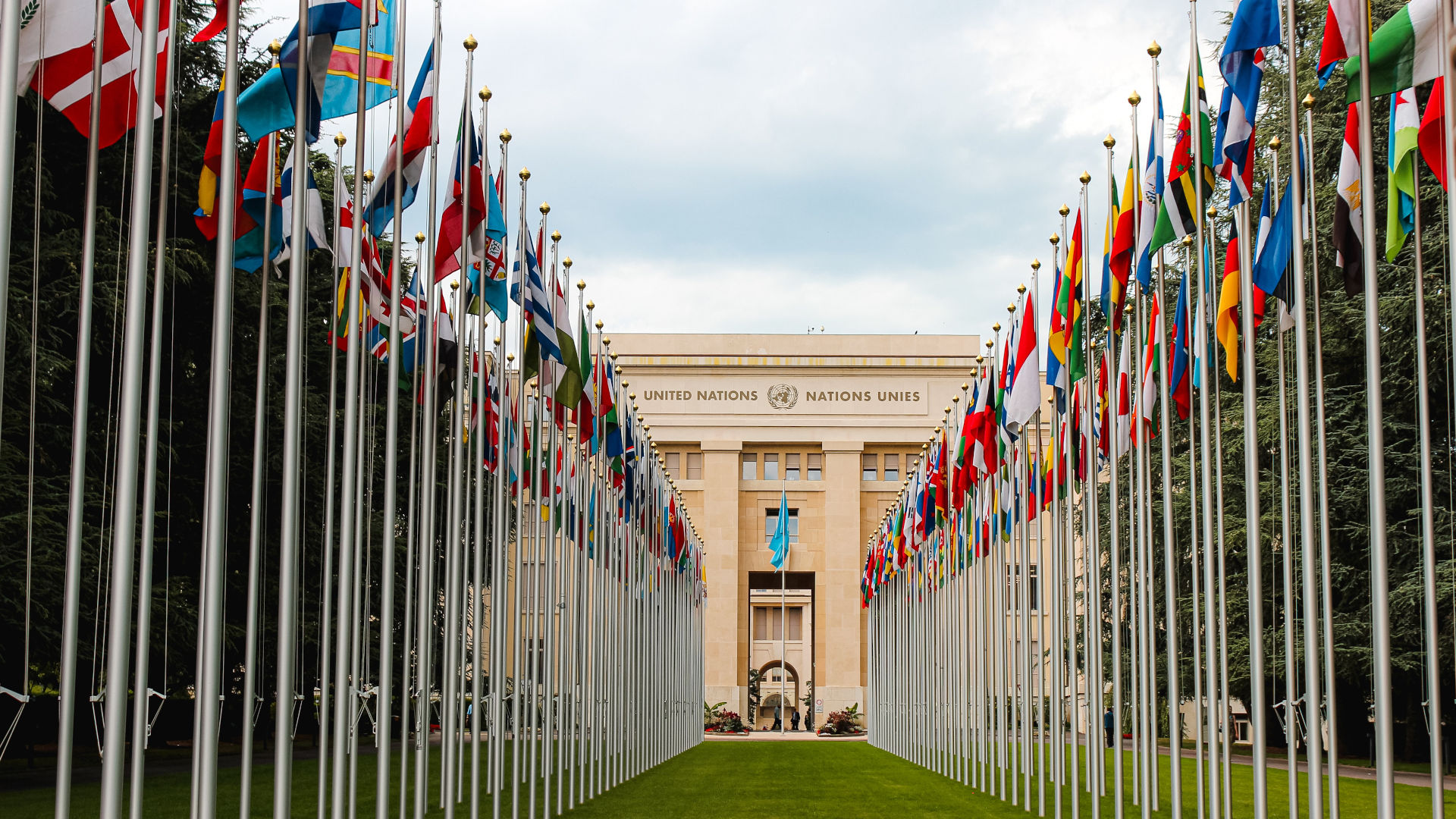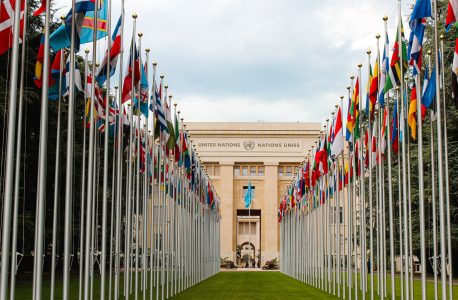In work for global justice and peace, not surprisingly, there are highs and lows.
My earliest ‘high’ comes in the form of a League of Nations colour poster issued just before the 1932 Geneva disarmament conference. It shows lots of children marching hopefully towards peace. The League of Nations Union in those days was a strong and popular body. This poster has powerful words: ‘The Nations have renounced war. Let them renounce the instruments of war’. But partly because Britain would not allow any reduction in Royal Navy numbers, there was no such renunciation. Hitler came to power and the world moved into World War II.
Nevertheless the seeds of international cooperation were sown. At the end of a terrible war came the formation of the United Nations in 1945. Another hopeful moment.
The UN Charter, signed on 26th June (very hard to get a print copy now) starts with a resounding warning. The UN’s priority task is: ‘To save succeeding generations from the scourge of war‘.
The UN has certainly helped to avert some wars and alleviate their consequences but the war scourge is still very much with us. Appalling threats of catastrophic destruction have been made too often, as the current North Korean crisis has shown.
But it is time for another ‘high’. We have just had one.
On 7th July 2017 a treaty was issued by the UN General Assembly, signed by 122 countries, renouncing nuclear weapons and calling for their elimination. If you do not know much or anything about it, this is partly because Britain and the other nuclear weapon states refused to take part. As a result our media paid little attention.
The terms of this Treaty could not be clearer: Article 1 says: “Each State party undertakes never under any circumstances to:
a) Develop, test, produce, manufacture, otherwise acquire, possess or stockpile nuclear weapons or other nuclear explosive devices.”
Six more subparagraphs then follow setting out in clear detail the implications and obligations of paragraph a).
This is a landmark treaty. It repudiates nuclear weaponry here and now, unlike the Nuclear Non-Proliferation treaty which, under article VI called only for negotiations aimed at nuclear weapon abolition to be conducted ‘in good faith’ .This is the get-out which the nuclear states gave themselves. It seems that this ‘good faith’ can go on indefinitely.
All that has happened since the NPT was signed in 1968 is that there are restrictions on atmospheric testing and the gross number of nuclear weapons has now fallen to something like 15,000. This is no more than good housekeeping. Why go equipped to destroy an enemy population many times when once ought to really be enough?
Our own country is now on the way to spending £205 billion on building and running another post-Trident generation of nuclear weapons.
This will keep us in the nuclear club for another 30 or more years. We are actually hardly in the club anyway. True, with United States technical help, we build our own nuclear warheads but the missiles on which we put them are borrowed from the United States. It would be very easy for an unfriendly United States president to deny us the missiles. A pile of warheads sitting at Aldermaston or Faslane, without missiles, would be a morbid tourist spectacle but not much more.
It is time we in the Unite Nations Association urged Britain to take some firm steps in the direction of global nuclear weapon abolition.
There are so many things to be said and done. Nuclear weapons do nothing to protect us from the various dangers we currently face. Ongoing are the risks of catastrophic accidents and misunderstandings. Robert McNamara, senior United States official, said towards the end of his life that we have not been saved by our good judgement but by good luck. He ought to know.
Our current terrorist enemies are by no means deterred by our weapons of mass destruction. How anyway does one deter those who are already suicidal? If nuclear weapons are supposed to add to security then why should we not tear up the NPT and let every state that can afford them, have them?
Some people, but sadly not enough, are restrained, not just by the instinct of self-preservation, but by universal morality and law. Nuclear weapons wipe away all distinctions between innocent and guilty, combatants and civilians. As we know from the experience of Hiroshima and Nagasaki they kill, not just present populations, but through fallout, future generations as well.
The UNA has much to do to help educate our fellow citizens. A little history would be a good start. Eighty years ago Clement Attlee, within a few weeks of the bombs on Japan, was calling for nuclear weapon elimination. That our country took the road it did was because of Ernest Bevin’s extreme nationalism. He wanted them here he said, “with a bloody great Union Jack on top” and sadly he got his way.
Surely it is now time to put the billions spent on nuclear weapon illusions and pretensions on the real needs, food, medical care, education, housing and much more, of our people? That is a challenge to be put now to all, especially our parliamentarians.




I am a Board Certified Psychiatrist, as well as a geologist who knows the parameters of climate change. In the Yale study, Donald Trump scored higher than Adolf Hitler on the Hare Psychopathy Scale. At this level we have a psychotic murderer with his finger on the nuclear button. He will knowingly bring about the extinction of humans. He recently is reported as giving a trillion dollars to make more and bigger nuclear bombs. These new bombs are more than 1000 times or more powerful than the bomb dropped on Hiroshima. The outcome will be human extinction, as the consequences will be worse than 100 years of nuclear winter. Trump doesn’t care, just as Hitler didn’t care.
Great post Bruce!